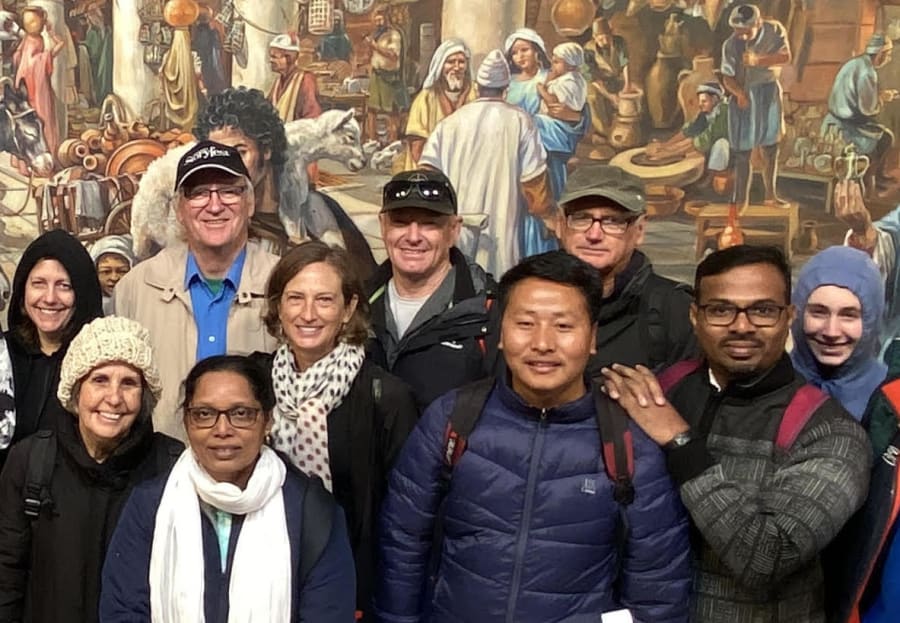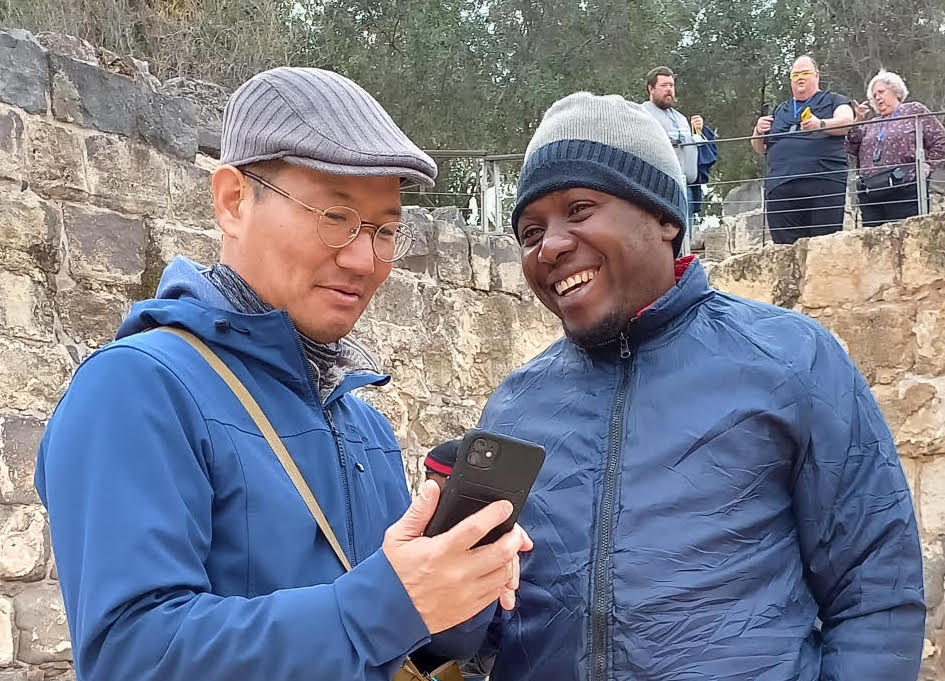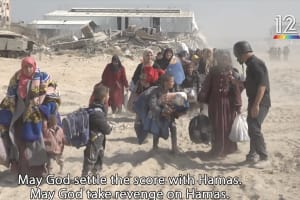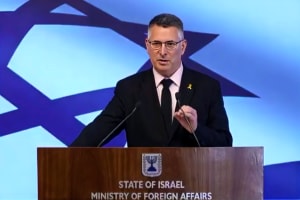Visiting the land of the Bible helps translators in ways they could not have anticipated
And videos will go a long way to reach illiterate and skeptical people groups who will see the sites for themselves

JERUSALEM—Visiting the land of Israel helps Bible translators choose the apropos words in their language. But the videos that two Kenyan translators filmed during their three-week trip to the Holy Land in January will be priceless in reaching the remote people groups of Kenya.
Many ethnic groups in Kenya – some of whom have never heard the Gospel and are widely illiterate – are suspicious and mistrustful of the biblical narratives and teachings of evangelists who visit their region, according to two translators who minister there.
However, seeing the imagery of the Holy Land through videos being created by these two translators will connect people from their own ethnic group to the stories of God’s Word in ways they could not have imagined.
“We are coming from a situation where the Bible is so much criticized as untrue,” one of the translators told ALL ISRAEL NEWS in an interview at the Austrian Hospice in Jerusalem’s Old City.
“Our people are widely uneducated and don’t have access to the internet. They cannot research or read for themselves,” he continued. “So it is helpful to hear and see. We are developing this evangelistic tool to present the information. We are taking all of this home with us.”
Both of these translators are church ministers in Kenya, currently working on a revision of the whole Bible in their own language. They were part of a 22-member team from Tanzania, India, Korea and Australia and part of the Wycliffe Australia Israel Study Tour 2023. Because of the precariousness of their home situation, the Kenyans asked that their names and pictures not be used.
ALL ISRAEL NEWS was invited to a debriefing at the end of the translators’ three-week trip to hear testimonials of how being in the land of the Bible influences and improves translations of the Word of God.
“We have come to see the reality of the Bible. We have confirmation that the Bible is true and it is reliable,” one of the Kenyan translators told ALL ISRAEL NEWS. “We want to do videos in our local languages so our people can connect and see the biblical sites.”
The experience will go a long way in translating for the Kenyans as well. They are currently revising the Bible in their own language – revising the translation completed 50 years ago.
“When you read the Bible, you can only imagine the events, but now we have a picture of the place,” one of the Kenyan translators said. “Sometimes when you read, you don’t know how far it is from one place to the next place. Now that will help in being more accurate and, of course, sharing our experience with our people for our people.”
Knowing that these two men have walked the land now will make a powerful statement.
“Even knowing that a place which is mentioned is there, that helps,” he continued. “Our people don’t have the capacity to Google, so to know that a place is still there, it is going to be helpful.”

INSIGHTS FROM ON THE GROUND
Last year at the height of the COVID-19 pandemic, the Wycliffe tour was one of the first groups back in Israel. Also led by Benn, many members of the group got stuck in Israel – in a "corona hotel" after they tested positive for the virus. ALL ISRAEL NEWS interviewed Benn about their experiences back then.
This year, the trip went off without a hitch and the translators gleaned from the experience which will impact their work.
“Before coming here, everything about the Bible and the Holy Land was only theory and imagination,” said William from Tanzania. “Now everything is real and it will help me to translate more accurately.”
“I will read the Bible now with better understanding, and this will surely improve the quality of my translation work,” said Reuben from Tanzania.
Peter from Tanzania added, “The tour has increased my belief that the Bible is real and not merely a story book. This is because we have been to many different areas where the Bible events actually happened, and so provide the proof without any doubt that the Bible is real.”
“In India where I live, we have high mountains, raging rivers and thick forest. Wherever the rivers, mountains and valleys are mentioned in the scripture, I imagined them to be that way. But in reality, the topography here is significantly different. This exposure to the geography of the land of Israel will enhance the accuracy of my translation of the scripture.”
Where I live in Australia,” said Barry, “the land is flat. I never imagined that Jesus was always climbing up hills, over rocks and down into valleys. He was some tough guy!”
Gong from India said, “I will highly recommend every Christian to come to Israel and experience the blessings just as I received - traveling to and fro throughout the Holy Land.
Siby from India said, “The Wycliffe Australia K2K Study Tour opened my eyes to see and study the Bible from another perspective. I believe that it was my most valuable learning experience.”
IN KENYA, PERSECUTION, CHALLENGES REMAIN
The two Kenyan ministers described a difficult situation in Kenya where the people face drought, famine, poverty and sometimes lethal persecution by marauding gangs who threaten converts to Christianity and marginalize Christian communities.
“Sometimes our people don’t even have a meal and you have nothing to offer them,” one of the ministers said.
While here in the land, the two Kenyans identified with Christians they met – also marginalized, many times persecuted for their faith and stuck between two sides.
“We have been touched by the political situation of the Christians here and we have a prayer item to go home: to pray for this land,” the translator said.
The people of their home region are mostly subsistence farmers who face three primary challenges: 1. The Christian minority is marginalized by the majority ethnic group, and denied privileges such as the ability to buy land; 2. They are caught up in tribal animosity; and 3. Rebel activity.
“These people wage war which affects the security of the region,” one of the ministers said. “It is a hardship area, with harsh conditions, drought.”
These men have initiated a Gospel Support Ministry to get Bibles to the people in their area and bring them the Gospel. But more Christian support is needed in order to make an impact. They said that after a drought forced 4,000 families off their land into refugee camps, Muslim charities came in to help and many of the people converted to Islam.
Reaching this region is only possible by foot. Itinerant ministers – such as the two interviewed here – must pack a bag and walk through the bush. They meet the village people who farm by day and gather under the “worship” tree by night for prayer, teaching and training them in the Word of God.
When people get saved or convert to Christianity, many times their families abandon or ostracize them. Many receive death threats.
They reported that many Kenyan pastors earn $100 or less a month, and sometimes must stop and work to make money for their families before they return to their ministry. One of the two interviewed said during 30 years of service, he had only received a salary for the past three.
Nevertheless, they have returned to Kenya in order to continue to share the good news – now with firsthand insights.
“Home is always home and that is where God has called us to serve,” one said. “At the end of the day, that is where God has called us to serve Him.”

Nicole Jansezian was the news editor and senior correspondent for ALL ISRAEL NEWS.













